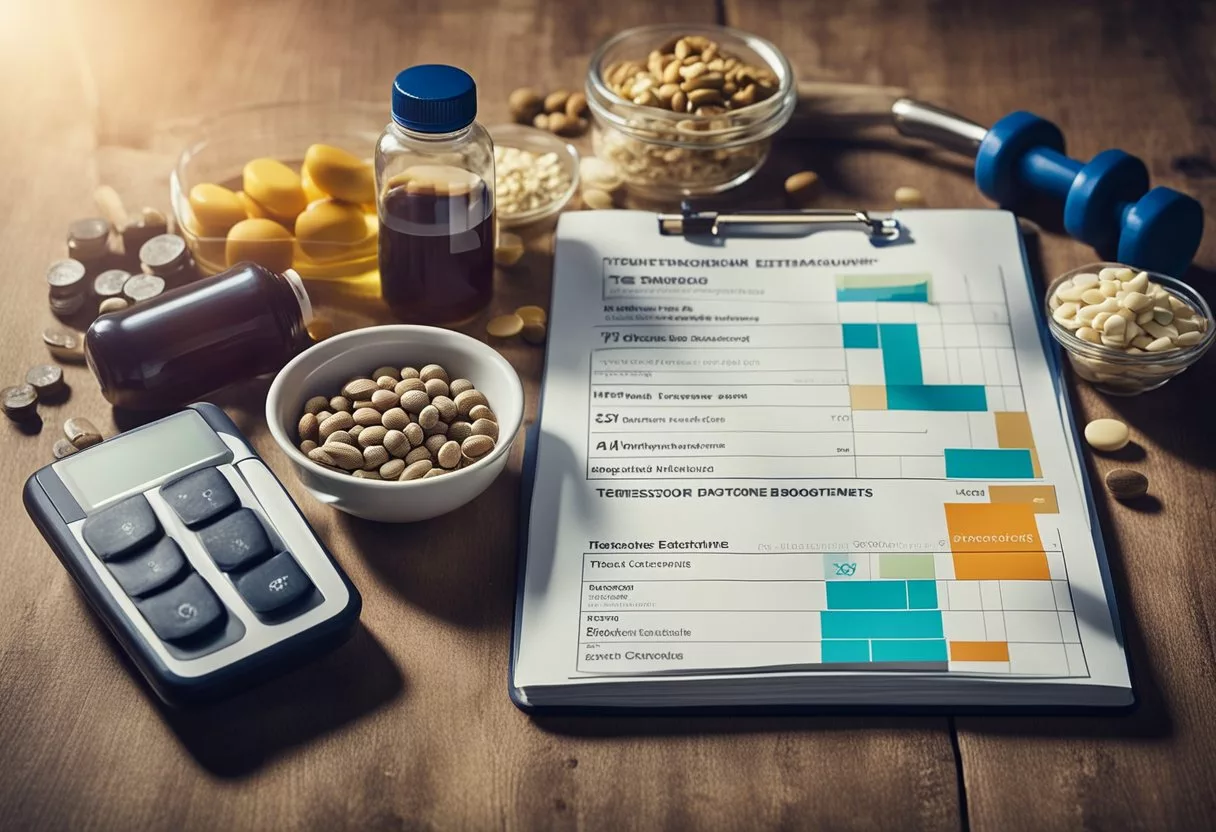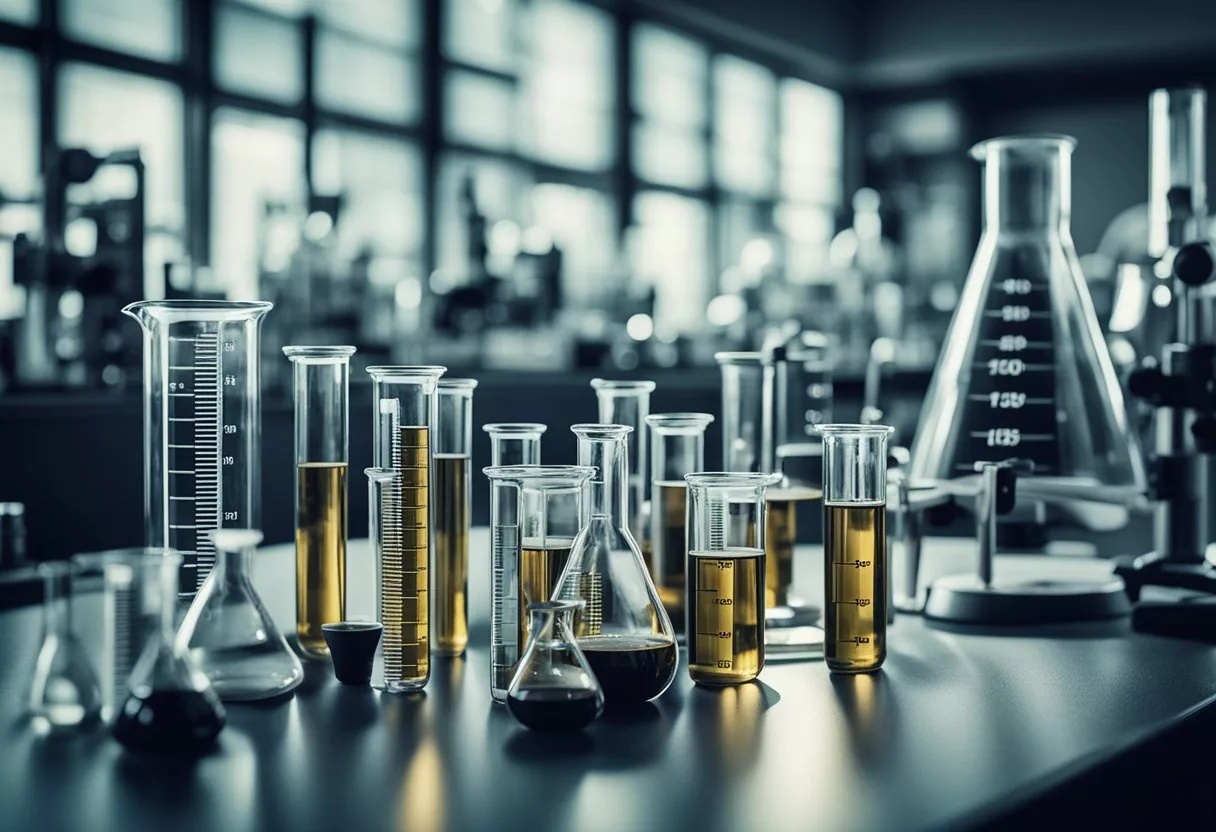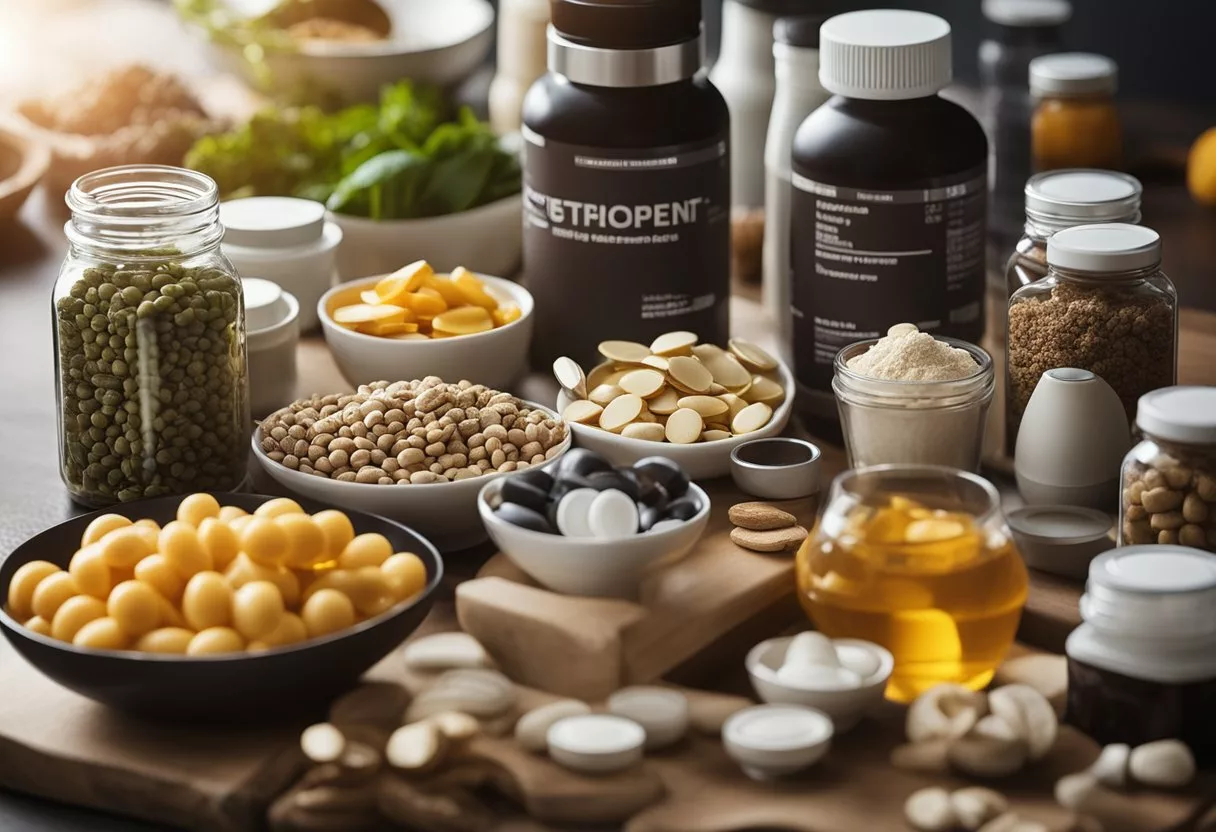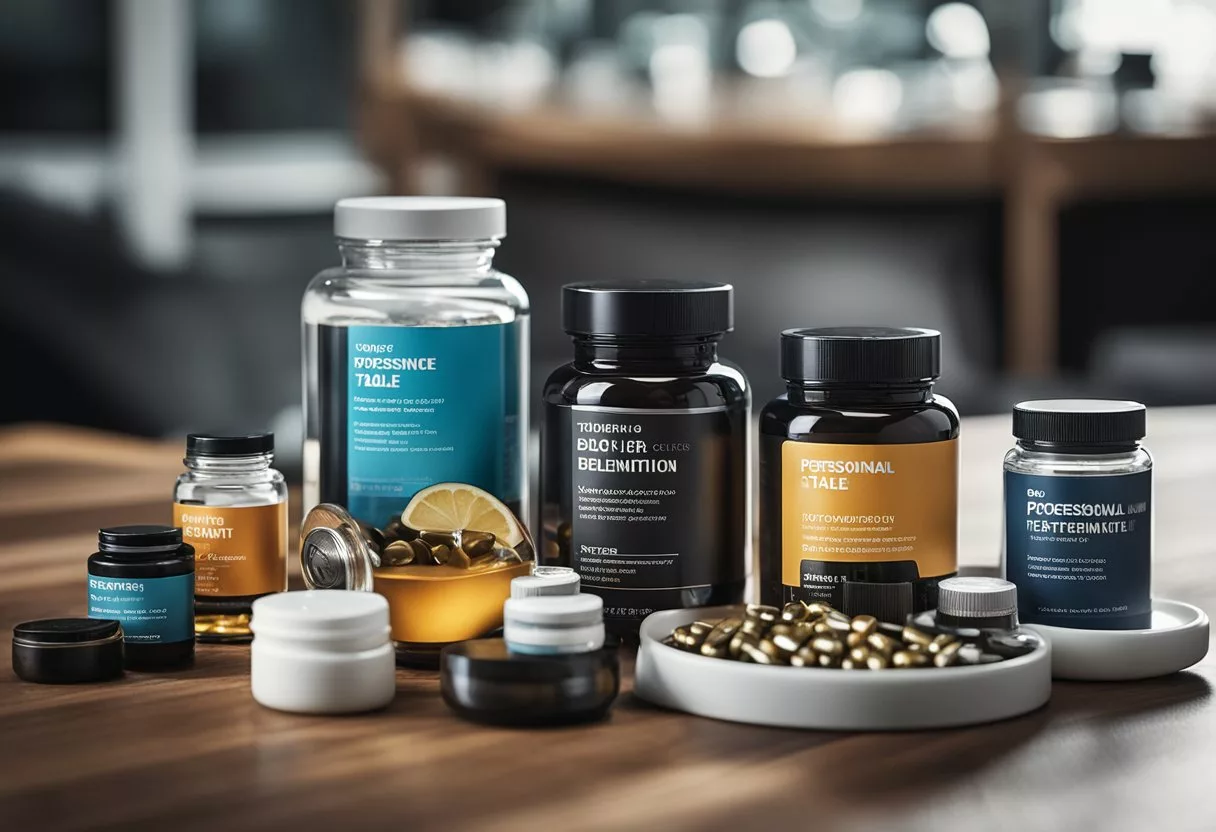Testosterone, a vital hormone in the human body, plays a crucial role in various physiological processes, especially in men. Known for influencing muscle mass, bone density, and sex drive, testosterone levels naturally fluctuate over a person’s lifetime. Concerns about testosterone deficiency and the pursuit of optimized health have driven many to explore how lifestyle choices can influence hormone levels.

Improving testosterone levels goes beyond the scope of simple dietary choices or fitness routines. It involves a holistic approach including consistent physical activity, proper nutrition, mental wellbeing, and environmental considerations. Safe and natural strategies for boosting testosterone could include mindfulness practices to reduce stress, which has been known to negatively affect hormone levels, as well as an evaluation of medical interventions where necessary.
Key Takeaways
- Testosterone influences multiple aspects of health, necessitating a multi-faceted strategy for boosting levels.
- Diet and exercise are foundational to maintaining optimal hormone levels, while stress management plays a significant role.
- Ongoing assessment and adjustment of lifestyle choices contribute to lifelong testosterone health management.
Understanding Testosterone

Testosterone, a vital hormone, plays a significant role in male development and health. It influences many body systems, indicating its essential nature in the body’s functionality.
Role and Importance of Testosterone
Testosterone, primarily regarded as the main sex hormone in males, is crucial for a variety of bodily functions. It’s responsible for the development of male sexual characteristics during puberty, including the deepening of the voice and growth of facial and body hair. Beyond these visible changes, testosterone is pivotal for maintaining muscle mass, bone density, and regulating mood. As a key player in male sex drive and fertility, testosterone also contributes to normal erectile function and libido.
In addition to its sexual functions, testosterone has important roles in overall health, assisting in the prevention of conditions like heart disease. The hormone also influences the body’s distribution of fat and the production of red blood cells. Studies have shown that balanced testosterone levels are important for reducing the risk of certain diseases, including diabetes and cancer.
Symptoms of Low Testosterone
Low testosterone, or testosterone deficiency, can manifest in various ways, with symptoms ranging from subtle to more pronounced. Common indicators include fatigue, depression, a decrease in sex drive, and difficulties with erection. Men may also experience reductions in muscle mass, increased body fat, and a decrease in bone density. Emotional changes like irritability or a lack of focus can also occur, highlighting how testosterone influences mental health as well as physical.
Testosterone and Aging
As men age, it’s natural for testosterone levels to decline; this is sometimes referred to as “andropause” or “late-onset hypogonadism.” The decrease typically begins after the age of 30 and continues with each subsequent decade. The change in hormone levels can affect all areas previously maintained by testosterone, including libido, muscle mass, and energy levels. While the process is natural, an individual’s lifestyle, health status, and certain medications can influence the rate of decline. Maintaining healthy hormone levels is beneficial for longevity and continuing vitality in later life.
Lifestyle Choices for Boosting Testosterone

To optimize testosterone levels, one’s daily habits play a crucial role. Incorporating specific lifestyle changes can significantly influence hormonal health.
Getting Adequate Sleep
Sleep is a fundamental pillar for maintaining hormonal balance. Studies highlight that men who sleep fewer than 5 hours per night for a week have notably reduced testosterone levels. Adequate sleep, typically 7 to 9 hours per night, can help maintain and boost testosterone levels as the body replenishes and repairs itself during this rest.
Managing Stress Levels
Chronic stress elevates cortisol, a stress hormone that negatively impacts testosterone. To boost testosterone, one must manage stress through practices like mindfulness, meditation, or regular physical activity. These interventions can lower cortisol levels and thus potentially support healthier testosterone levels.
Maintaining a Healthy Weight
Obesity is closely linked to lower testosterone levels. Achieving and maintaining a healthy weight through a balanced diet and regular exercise can prevent weight gain’s negative impact on testosterone. It’s vital to focus on long-term lifestyle changes rather than quick fixes for sustainable hormonal health.
Avoiding Excessive Alcohol Consumption
Heavy alcohol use can lead to a reduction in testosterone levels. For those looking to boost testosterone, it is advisable to consume alcohol in moderation or abstain altogether. Limiting intake to a few drinks on occasion can help avoid the potential testosterone-lowering effects of excessive alcohol consumption.
Nutritional Strategies

Nutrition plays a critical role in regulating testosterone levels, with certain macronutrients and micronutrients exerting significant influence.
Macronutrients and Testosterone
Protein is essential for maintaining healthy testosterone levels, as it aids in the repair of tissue and the production of hormones. Incorporating sources like lean meats, eggs, and milk ensures the body has the building blocks for testosterone synthesis. Healthy fats are equally important; they provide the cholesterol needed for testosterone production. Foods rich in omega-3 fatty acids, such as salmon and tuna, support hormone health and can improve fertility.
When it comes to diet, balancing carbohydrates is key. High intakes of refined sugars and processed foods can lead to insulin resistance and a potential reduction in testosterone levels. Replacing simple sugars with more complex carbohydrates found in fruits and vegetables can help maintain optimal hormone levels.
Micronutrients That Support Testosterone
Several micronutrients are directly involved in testosterone production:
- Vitamin D: Sunshine is a natural source, but diet can also supplement, especially through fortified foods.
- Zinc: Vital for testosterone production, fertility, and the immune system, zinc can be found in shellfish, meat, and nuts.
- Magnesium: This mineral supports hundreds of biochemical reactions in the body, including testosterone synthesis. Leafy greens, seeds, and whole grains are good sources.
Ensuring adequate intake of these nutrients either through diet or supplementation is important for maintaining healthy testosterone levels.
Foods to Include and Avoid
To support testosterone levels, certain foods should be included in one’s diet while others are best minimized or avoided:
Include:
- Fatty Fish: Such as salmon and tuna, for omega-3 fatty acids.
- Eggs: For protein and cholesterol, necessary for hormone production.
- Vegetables: Particularly leafy greens rich in magnesium.
- Fruits: As sources of complex carbs, avoiding sugar spikes.
Avoid:
- Sugary Foods and Drinks: To prevent high insulin levels.
- Excessive Alcohol: Can negatively impact hormone balance.
- Foods High in Soy: Contain phytoestrogens that may affect testosterone levels in large quantities.
A balanced diet rich in specific nutrients can certainly influence testosterone production and overall hormonal health.
Physical Activity and Hormone Health

Engagement in regular physical activity is a well-established method to maintain and promote hormone health, including testosterone levels. Different types of exercises are known to have varying impacts on hormone production and muscle development.
Resistance Training Benefits
Resistance training, such as lifting weights, is a cornerstone for increasing testosterone levels and muscle strength. It stimulates muscle fibers leading to microtears that, when healed, result in muscle growth. This process is supported by an increase in testosterone, which is released in response to the muscular strain. The synthesis of testosterone is particularly high after sessions involving large muscle groups.
- Key exercises include bench press, deadlifts, and squats.
- Training should aim for moderate to high intensity, utilizing heavy weights that can be lifted for about 4-6 repetitions across several sets.
Cardiovascular Exercise
Cardiovascular exercise, or simply cardio, is recognized for its benefits to heart health and its potential to moderately increase testosterone levels. Unlike resistance training, the focus here is on endurance and aerobic capacity which can also contribute to overall hormone balance.
- Activities such as brisk walking, running, and cycling are effective forms of cardio.
- Consistency in moderate-intensity cardio, at least 30 minutes daily, is recommended for foundational hormone health.
High-Intensity Interval Training (HIIT)
High-Intensity Interval Training, or HIIT, involves short bursts of intense physical activity followed by periods of rest or low-intensity exercise. This type of training has been shown to produce a significant acute hormonal response, including the release of testosterone, which is favorable for those looking to improve their sex drive and muscle strength.
- A typical HIIT session might consist of 30 seconds to a few minutes of intense exercise such as sprinting or kettlebell workouts, followed by rest or low-intensity exercise.
- Incorporating HIIT 2-3 times a week can be a powerful catalyst for hormonal health, but adequate recovery time is crucial to prevent overtraining and counterproductive hormonal changes.
Supplementation and Testosterone

Supplements can play a key role in optimizing testosterone levels. This section examines various supplements and their specific impacts on testosterone production.
Testosterone Boosting Supplements
Testosterone boosting supplements are specifically designed to support the body’s natural production of testosterone. Common ingredients include:
- DHEA (Dehydroepiandrosterone): A hormone that serves as a precursor to testosterone. The body’s DHEA levels tend to decrease with age, and supplementation may help to maintain healthy testosterone levels.
- Zinc: An essential mineral important for testosterone production, with studies suggesting zinc deficiencies can lead to lower testosterone levels.
Vitamin and Mineral Supplements
Several vitamins and minerals have been linked to testosterone production:
- Vitamin D: Often referred to as the “sunshine vitamin,” it is associated with higher testosterone levels when the body reaches sufficient levels.
- Magnesium: This mineral is thought to have a positive effect on the quality of sleep, which can be beneficial for maintaining optimal testosterone levels.
Herbal Supplements and Their Effects
Herbal supplements often come from traditional medicine and have been used for ages for their potential endocrine benefits:
- Ashwagandha: An adaptogenic herb that has been shown to help reduce stress and may also help to increase testosterone levels, which could improve libido and erectile dysfunction in men.
- Fenugreek: Claims to boost testosterone have been linked to fenugreek, which may also play a role in improving exercise performance and sexual function.
Medical Interventions and Considerations
Medical interventions for low testosterone primarily involve testosterone replacement therapy (TRT), with various administration methods, such as gels, patches, and injections. Careful consideration is necessary to understand the therapy’s nuances and potential risks.
Understanding Testosterone Therapy
Testosterone therapy is prescribed for men with low testosterone levels, a condition also known as hypogonadism. TRT can significantly improve sex drive, fertility, hormone production, and general well-being. The treatment includes different medications and administration modes:
- Gels: Applied to the skin, allowing testosterone to be absorbed into the bloodstream.
- Patches: Worn on the skin to provide continuous testosterone delivery.
- Injections: Testosterone is directly injected into the muscle, typically every 2-4 weeks.
Before starting TRT, a blood test is essential to confirm low testosterone levels. During therapy, regular monitoring is crucial to adjust dosages and manage hormone levels effectively.
Potential Side Effects and Risks
While testosterone therapy can be beneficial, it is not without risks and side effects. Patients considering or undergoing TRT should be aware of potential concerns, such as:
- Heart-related issues: There is a possible link between TRT and an increased risk of heart problems. Patients with a history of heart disease should discuss this with their healthcare provider.
- Effect on testicles: TRT can cause testicles to shrink, reducing natural hormone production.
- Impact on fertility: Testosterone therapy may decrease sperm count, adversely affecting fertility.
- Opioids and hormone production: Use of certain medications, like opioids, can interfere with natural testosterone production.
Regular medical assessments are integral to managing these risks, ensuring the benefits of TRT outweigh potential adverse effects.
Environmental Factors and Endocrine Health
Testosterone levels can be significantly influenced by environmental factors. Exposure to certain chemicals and toxins has been linked to hormonal imbalances and disruptions that can affect overall health and specifically testosterone production.
Impact of Chemicals and Toxins
Exposure to certain environmental chemicals and toxins can lead to endocrine disruption, which in turn may negatively impact hormone levels, including testosterone. A specific group of chemicals to be cautious about are known as endocrine-disrupting chemicals (EDCs). EDCs can mimic, block, or interfere with the body’s hormones.
- Phthalates and Bisphenol A (BPA): Found in plastics and resins, these chemicals can mimic estrogen in the body, potentially leading to a decrease in testosterone.
- Pesticides: Certain pesticides may alter hormone levels by mimicking hormones and by affecting hormone synthesis.
- Industrial Chemicals: Substances like polychlorinated biphenyls (PCBs) and dioxins, often a result of industrial processes, are known to disrupt endocrine function.
One should consider lifestyle changes to minimize exposure to these harmful substances by:
- Choosing BPA-free products when available.
- Opting for organic produce to reduce pesticide ingestion.
- Limiting the consumption of food and beverages stored in certain plastics.
As these environmental factors can lead to a decrease in testosterone and other health issues, it’s crucial to understand their impact on hormone health and take proactive steps to mitigate their effects.
Mental Health, Testosterone, and Libido
Mental health significantly influences an individual’s hormonal balance and sexual functions. Testosterone levels, mood, and libido are closely interrelated, where changes in one can lead to shifts in the others.
Psychological Aspects of Hormonal Balance
Stress and depression are known to affect hormonal balance in the body. When an individual is stressed, the body responds by releasing cortisol, a hormone that can negatively impact testosterone production. Chronic stress might lead to sustained levels of cortisol, which in turn can lead to depletion of testosterone over time, affecting libido and overall energy levels.
Depression can similarly lower a person’s sex drive, as it is associated with a decrease in the production of testosterone. This hormonal change can lead to a decline in energy and mood, potentially exacerbating symptoms of depression. As men age, the natural decline in testosterone levels can also contribute to feelings of depression and reduced sex drive.
Erectile dysfunction (ED) is another condition that is often linked to both mental health and low testosterone levels. The presence of ED can lead to stress and reduced self-esteem, which in turn may further impede an individual’s libido and overall mental well-being.
Ultimately, maintaining good mental health is key for keeping testosterone levels within a normal range and preserving sexual health. Practices such as mindfulness, regular exercise, adequate sleep, and healthy stress management can support not only mental health but also help in maintaining healthy testosterone levels and libido.
Special Considerations for Men’s Health
Testosterone impacts various aspects of men’s health including fertility, prostate health, and the hormonal changes that occur with aging. Understanding these effects is imperative for maintaining overall well-being.
Testosterone’s Role in Male Fertility
Testosterone is pivotal for male fertility, influencing both sex drive and sperm production. Optimal levels are essential as they regulate the function of the testicles and resultant sperm count. Low testosterone, or hypogonadism, can lead to infertility.
- Sex drive: Adequate testosterone levels are associated with maintaining libido.
- Sperm production: Testosterone stimulates sperm production within the testicles, affecting both quantity and quality of sperm.
Testosterone and Prostate Health
Prostate health is closely related to testosterone levels. While normal levels support prostate function, there is a complex relationship with conditions like prostate enlargement and cancer.
- Conditions: Elevated testosterone levels have been linked with an increased risk of certain prostate conditions, though the exact relationship remains under study.
Age-Related Hormonal Changes
As men age, they typically experience a gradual decrease in testosterone levels, an aspect of andropause, which is similar to menopause in women. This can affect several areas of men’s health.
- Hormone levels: From about the age of 30, testosterone levels drop approximately 1% per year.
- Erectile dysfunction: A decline in testosterone can lead to difficulties with erectile function.
- Testicular size: Hormonal changes can also cause changes in the size of testicles.
Maintaining healthy testosterone levels is crucial for men’s health, particularly concerning fertility, prostate health, and the natural process of aging.
Lifelong Testosterone Management
Proper management of testosterone levels involves adopting long-term strategies that contribute to hormonal health and can mitigate the natural decline in testosterone due to aging.
Long-Term Strategies for Hormonal Health
Nutrition: Sustaining a balanced diet rich in zinc, magnesium, and vitamin D is essential. These nutrients are found in foods such as:
- Zinc: Oysters, beef, and oats
- Magnesium: Nuts, seeds, spinach, and beans
- Vitamin D: Fatty fish and fortified milk
Exercise: Regular physical activity, especially strength training, helps maintain muscle mass and supports healthy testosterone levels. Resistance exercises, such as weightlifting, are particularly beneficial.
Maintaining a Healthy Weight: Excessive fat, especially abdominal fat, can adversely affect hormone levels. A consistent routine combining diet and exercise can help manage weight and testosterone levels.
Overall Health: Chronic conditions like diabetes and metabolic syndrome are linked to lower testosterone levels. Managing these health issues is crucial for maintaining hormonal balance.
Lifestyle Changes: Avoiding excessive alcohol and maintaining good sleep patterns are lifestyle habits that support hormone production and overall health.
Aging: As aging is a natural cause of testosterone decline, ongoing monitoring and consulting with healthcare professionals ensure that hormone levels are maintained within a healthy range for one’s age.
By integrating these key components into one’s routine, individuals can manage testosterone levels effectively throughout their lives.
Frequently Asked Questions
This section provides clear answers to common inquiries about boosting testosterone levels through diet and lifestyle.
Which fruits are known to elevate testosterone levels?
Certain fruits, such as bananas, avocados, and berries are linked to higher testosterone production due to their rich content in vitamins and enzymes that can aid hormonal balance.
What dietary changes can men make to naturally increase testosterone?
Men can focus on a diet rich in lean proteins, healthy fats, and whole grains, while also incorporating foods like tuna, egg yolks, oysters, and fortified cereals that are known to support testosterone levels.
Can the consumption of milk affect testosterone levels, and how?
Milk consumption may affect testosterone levels, especially if the milk contains synthetic hormones or is high in fat. Choosing organic, hormone-free, or skimmed milk can mitigate negative impacts on testosterone.
What strategies can teenagers employ to safely boost testosterone?
Teenagers can enhance testosterone production by engaging in regular physical activity, getting adequate sleep, maintaining a balanced diet, and avoiding processed foods and sugar excess.
Are there specific foods that can help increase testosterone in females?
Women may experience an increase in testosterone levels by including protein-rich foods, such as lean meats and legumes, along with whole grains and nuts in their diets, all of which support overall hormonal health.
What are common foods that could potentially lower testosterone in the body?
Foods high in soy, alcohol, and certain dairy products have been associated with lower testosterone levels. Additionally, excessive sugar and processed foods may adversely affect testosterone production.